Tensions flared at the 2025 China Chongqing Auto Forum as senior executives from BYD, Geely, and Great Wall Motor (GWM) exchanged public criticisms, underscoring the deepening divisions in China’s electric vehicle (EV) industry. The confrontations came against a worsening price war and declining industry profit margins. BYD’s General Manager of Branding and Public Relations, Li Yunfei, ignited the weekend’s most talked-about moment by condemning specific unnamed competitors for what he described as “dirty tricks,” “smear campaigns,” and underhanded tactics aimed at manipulating public opinion.
This marks a sharp departure from BYD Chairman Wang Chuanfu’s emotional 2023 appeal for unity with the phrase, “Together, we are China’s auto industry.” Two years later, that unity appears fractured. At the same forum, Geely Holding’s Senior Vice President Victor Young responded forcefully to Li’s remarks, accusing BYD of hypocrisy and suggesting that BYD’s narrative was an attempt to mislead. “Isn’t this just a case of the thief crying thief?” Yang retorted that regulatory scrutiny should replace emotional appeals in settling disputes like GWM’s formal complaint over BYD’s fuel tank design.
The clashes were not limited to BYD and Geely. Weeks earlier, GWM Chairman Wei Jianjun warned of a brewing crisis in the industry, likening it to a ticking time bomb. Huawei’s Yu Chengdong also criticised rivals who succeed with a single product, prompting Xiaomi’s Lei Jun to counter online: “To slander is to look up in awe.” These exchanges have crystallised into open factions within the industry, with Chery taking a more moderate tone. Chery Executive Vice President Li Xueyong acknowledged intense competition but argued that industry challenges could drive long-term health if carmakers focused on core capabilities.
Li Yunfei defended BYD’s restraint in not naming competitors directly, citing an internal directive from Wang Chuanfu not to engage in public mudslinging. Still, he described some industry peers as “stupid and malicious” and called for government authorities to step in against what he described as coordinated misinformation campaigns. Victor Young dismissed the moral posturing, warning that terms like “non-cooperative” and “bad actors” are no substitute for the rule of law. Several industry leaders echoed Young’s sentiments. GAC Aion’s deputy general manager, Xiao Yong, described Young as a “spokesperson for the industry.” At the same time, Seres Chairman Zhang Xinghai warned that the competitive environment had become unsustainable, with reduced profits and investment in innovation. Executives from Changan, and Chery, similarly called for a more principled approach to competition.
The underlying cause of the tension is the intensifying price war. According to the China Council for the Promotion of International Trade’s Auto Branch, more than 200 models saw price cuts in 2023. In the first four months of 2025 alone, over 60 models have followed suit. The situation peaked in May when over 100 models were discounted across top brands. Profit margins in the sector have collapsed—dropping to just 3.9% in Q1 2025, compared to 8.99% in 2014. The result: an increasingly toxic market in which volume growth masks eroding financial health.
On May 31, the China Association of Automobile Manufacturers (CAAM) released a statement condemning predatory pricing practices, specifically targeting sales below cost to eliminate competition. Days later, the China Automobile Dealers Chamber of Commerce issued a separate warning against pressuring dealers with unrealistic sales targets, calling such tactics unsustainable.
These moves reflect a broader shift from moral appeals to regulatory enforcement. Industry observers note that as EV penetration exceeds 40%, the Chinese auto sector collides with scale-driven growth limits. Once shielded by state support and high margins, manufacturers are now caught between cutting prices to stay competitive and investing heavily in advanced tech such as autonomous driving and solid-state batteries.
The fallout is visible. Even Tesla, once dominant in Europe, saw its Q1 2025 sales plunge 36% year-on-year to just 53,200 units, with countries like Germany and France experiencing over 60% drops. The price war has led to a collapse of once-profitable pricing structures, creating a market where selling more no longer guarantees profitability.
As the EV game enters its mid-phase, all players are doubling down. The cost of staying at the table rises while the room for error shrinks. Whether the forum’s fiery exchanges mark a turning point—or merely another skirmish in a prolonged battle—remains to be seen. However, one thing is clear: the age of unity in China’s auto industry has given way to a fight for survival.
Follow us for ev updates
